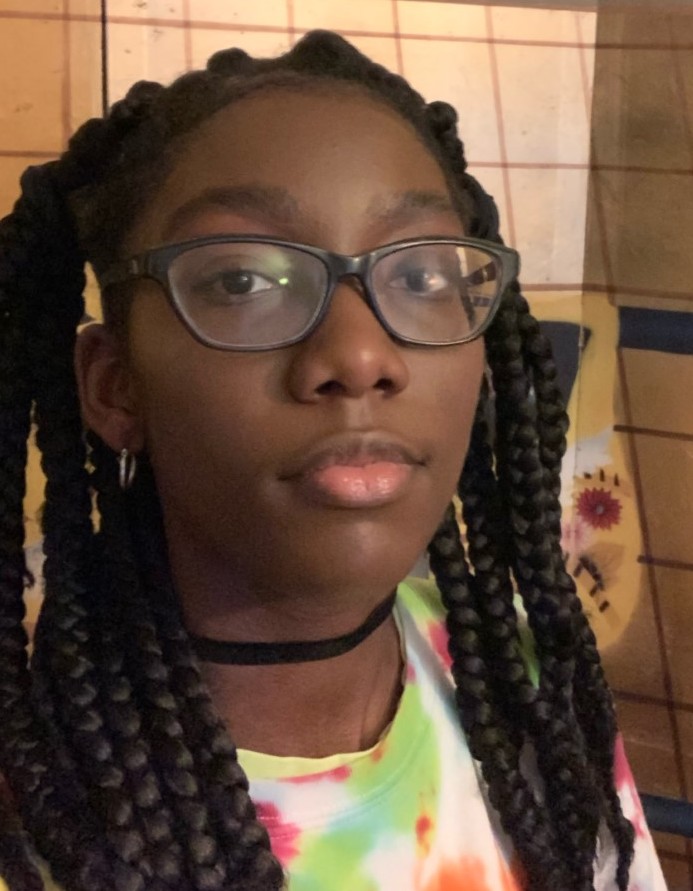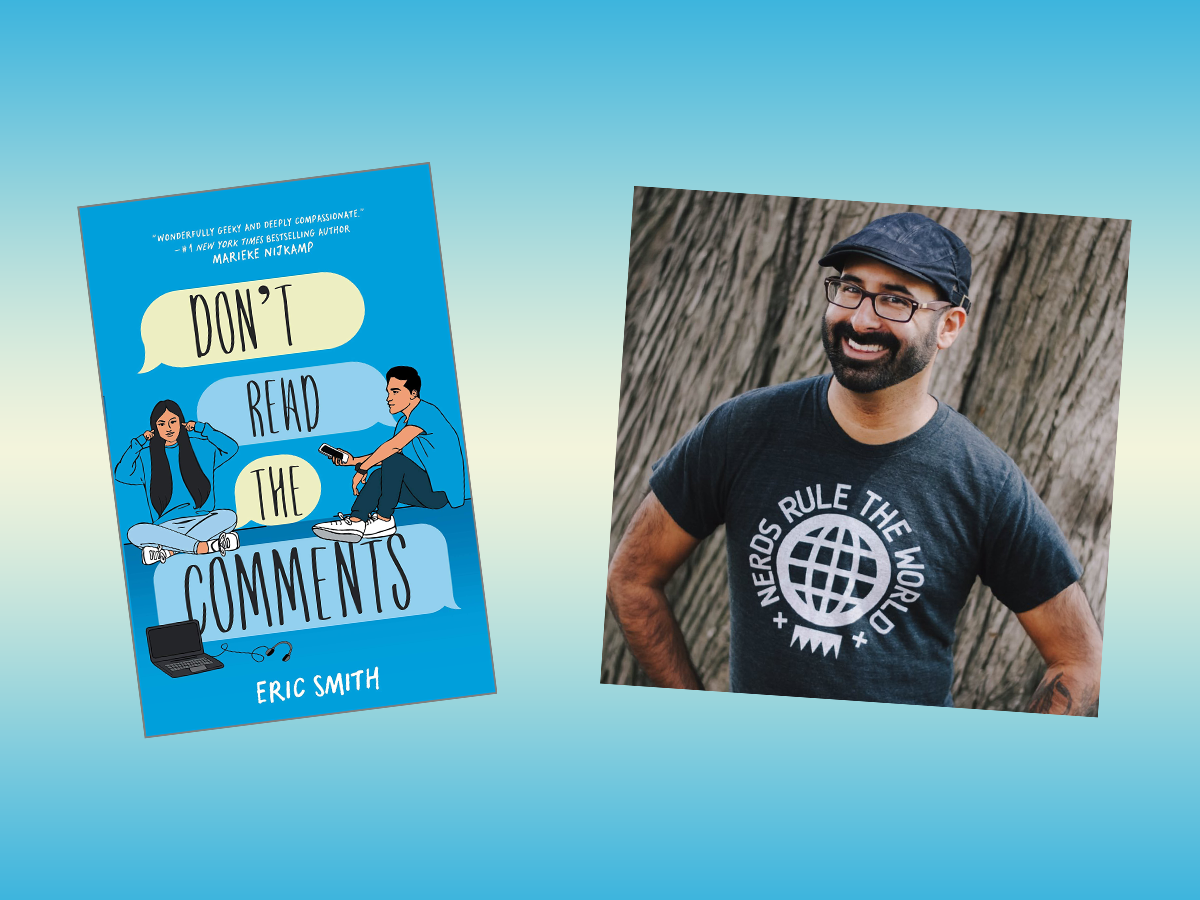Eric Smith is the author of the newly published Don’t Read the Comments. The story follows Divya, and her struggle with the fame and notoriety of being a popular female streamer in the predominantly male gaming community; and Aaron, a boy who means well but struggles with the execution. Divya’s safety is threatened when she is doxxed by vocal opposition to her success. I had the good fortune of being able to ask Eric Smith questions via email about his book and writing.
Remedythe Williams: As a female gamer myself, I find it interesting that you would choose this particular story. Is there a reason for it or was it just something that you wanted to take on?
Eric Smith: There were a few reasons I wanted to dig into this specific story! One, was the concept of safe spaces. I’d moved away from home for a while, and all my friends had become virtual for a bit, and the idea of having my virtual space taken from me was something I couldn’t quite shake, especially as I watched it happen to several friends. And that leads me to the other big reason, the rise in cyber-harassment against women, people of color, folks in the LGBTQ+ community of gamers… it was taking off in a massive, public and terrifying way around the time I was working on the first draft of this novel. I wanted to talk about it.
RW: Was there anything in the process of writing this novel that felt too heavy? You touch, though briefly, on some heavy underlying issues with other characters. The story itself covers a fairly heavy topic of females in predominantly male spaces, following Divya’s struggle with the fame and notoriety of being a popular female Glitch streamer. It even gets to the point where her safety, and of the people close to her, are threatened. Were these topics that you wanted to explore in later works or was this something that you felt fit the progression of the story?
ES: A majority of what happens with Divya and Rebekah felt too heavy while I was writing it. It hurt. But I wanted what happens in the novel to reflect the harsh reality. I go to a lot of conventions, and while they should be a safe space, where community is celebrated… all too often you get horror stories. I believe you can absolutely love something while being critical of it, hence the story that unfolds here. There’s work to be done.
RW: The novel features characters of color as prominent, main characters. Did you think about this or was it just something that happened?
ES: Oh, this was very intentional. It’s important for me to see characters like the people in my life on the page, reflected back. If my son grows up not seeing a diverse library on his bookshelf, from both the books I write and the authors I work with in my agent life, I’ve failed at my job.
RW: In writing Don’t Read the Comments, is there anything that you learned? Is there a particular message that you wanted to evoke with the story?
ES: I learned a bit about my own writing process (more on that in a minute!), but also about how themes can sometimes surface unintentionally… and in a necessary way while writing. Aaron’s journey is one about learning to navigate allyship without becoming toxic or unwelcome, and we see him being checked by his best friend pretty frequently. This rolled out while I was writing, and I quickly realized I couldn’t tell the story without that aspect of it. Because learning how to be a good ally to someone, is just so important, and Aaron’s lived a relatively privileged life. He has to learn.
RW: Was there any variation in your usual writing routine? What would a typical writing day look like for you? Snack breaks? Coffee or tea breaks?
ES: With this one, yes. Huge variation. The book I wrote before this one, The Girl and the Grove, took me a solid two years to write. I spent a wild amount of time on that draft. With Don’t Read the Comments, I went on my first big writing retreat, where I was off the grid for ten days… and I finished the first draft in those ten days. Now, don’t get me wrong, it was REALLY BAD, and I spent a solid year editing and polishing it up before I could even think about sending it to my agent… but it was the first time I just power drafted something. And now that’s more my approach. Get the story out, no matter how bad. Just get it on the page and polish it up later.
As for usual routines, I just try to get the writing in when I can. I definitely dig into my manuscript ideas once a week or so, and whenever I can sneak away otherwise. But it gets trickier, balancing writing life and work life with baby life! 🙂 It can’t all be ALL writing all the time, or you burn out! My advice is to just find that time when you can, be protective of it, and avoid the burn out that comes from doing too much in too little time.
RW: Is there anywhere or thing in particular that tends to spark inspiration for you? Or do you find it anywhere? I know that I personally like to let my ideas stew for a while before I try to make them look coherent. Is the process different for you?
ES: My family, my friends. Wandering outside and taking long walks. Playing really intense video games where you can explore a lot. Skyrim is a great place to get lost and inspired, that’s for sure. My favorite place to find inspiration is just the world around me and my life. Erin Bowman (you should read her, she’s great) dishes out the advice to “mine your life” and that’s something that has worked for me for a while. Mine away. Find the inspiration in what you’ve lived. You’ll be surprised what you find.
RW: In a sense, you live a double life. One part as a literary agent, and the other as an author. Is there anything that you draw from being a literary agent that affects your life as an author?
ES: It’s true! And honestly, not really, though I WISH it did. I sometimes wish I could turn on the business side of my publishing mind, that tells me when a book might not sell, when a concept is a bad idea… but I just can’t do it. I’m very much in the “write the book of your heart” camp, and just write what works for me. Market be damned!
RW: Your second main character — Aaron — has an interest in writing for games. Is this a reflection of yourself, like his computer that he put together, or a hint at something that you’ve been wanting to try?
ES: Hahah, yeah a little bit! I always daydreamed of writing an RPG one day, but I also learned how wildly hard it is to write video games! I’m lucky enough to work with a few people who do. It’s still a daydream of mine though. Maybe one day. The computer building was 100% me as a kid, and it drove my parents wild. More than one computer exploded in my basement. I don’t recommend doing this.
RW: There’s a parody of Twitch — Glitch — included in Don’t Read the Comments. I’m a fairly avid watcher of Twitch gamers and wondered if there was any amount of research that you had to do to write the novel? Was this something you were already interested in to begin with, and if not, did you happen to develop an interest in it?
ES: There was! Though there are definitely some liberties taken with the way streaming works on that platform and how the channel functions, that’s for sure. It wasn’t something I was initially really interested in, but instead, my nephews were. I’d watched them streaming Let’s Play videos every holiday with a mix of old-man-grumpiness (back in my day, we played video games!) and fascination. I started digging into those videos, because I just had to know what it was all about. I found a really unique community there, blending good and bad, and I wanted to dig into it.
RW: Is there a game that you based the main platform of play — Reclaim the Sun — on? The concept of it feels familiar but different. It’s certainly something I would be willing to spend money on.
ES: I’m so glad that it felt familiar and different, because it absolutely is based on some real games! And I would definitely pick this game up if it was real and buy-able. The in-book game draws inspiration from games like World of Warcraft, Eve Online, and No Man’s Sky, pulling a little from each of them, from the guilds to the generated planets to the economic systems.
RW: I’d like to thank Eric for granting me this interview, and note that I will be making use of some of his stellar advice in the near future. Don’t Read the Comments is a wonderful, inspiring tale about making a space your own and what it means to be an ally. It can be found in a bookstore near you now.

Remedythe Williams is a senior at Drexel University majoring in Psychology. In her spare time, she works on her manuscript in hopes of getting it published.
